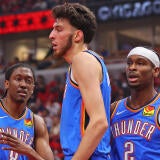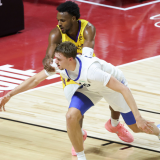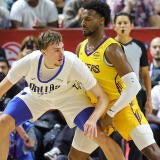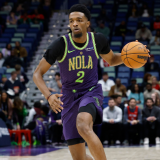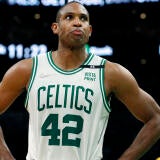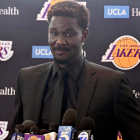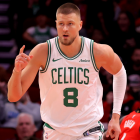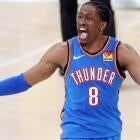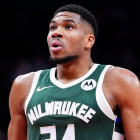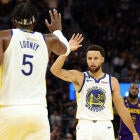LeBron James still deserves a max salary, but Lakers probably need him to take less to compete for NBA title
James has a $52.6 million player option for next season
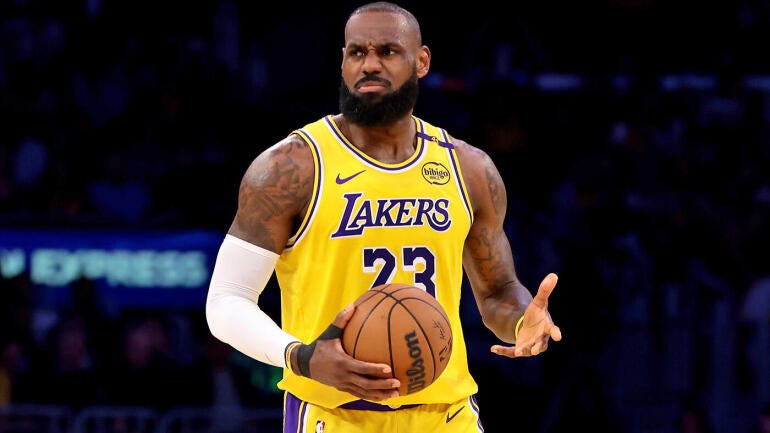
LeBron James didn't sign a max contract when he joined the Miami Heat in 2010. Instead, he took slightly less as a way to help Miami put the best possible roster around him. They won two championships in the years that followed, but the Heat also took advantage of James' generosity in ways that reportedly bothered him. They waived key role player Mike Miller using the amnesty clause, for instance, purely to save money against the luxury tax. When James became a free agent again in 2014, he made it clear from the jump that there would be no more discounts. He would only consider signing for the maximum salary.
From 2014 through 2024, that remained the case. He was worth every penny, and as long as that remained the case, there was a widespread assumption that he would continue to receive his highest possible salary. But with the Los Angeles Lakers severely restricted in terms of spending power, James reportedly offered them a gift: he would be willing to take a significant pay cut -- roughly in the neighborhood of $15 million -- to help them pursue anyone on a short list approved free agents using either the mid-level exception or a sign-and-trade.
"He is prioritizing a roster improvement," James' agent, Rich Paul, told ESPN's Dave McMenamin at the time. "He's been adamant about exuding all efforts to improve the roster."
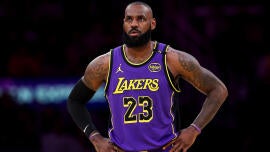
The Lakers made a run at Klay Thompson. They wound up losing out to the Dallas Mavericks. So James rescinded his offer, still giving up a much smaller figure in order to help the Lakers avoid the dreaded second apron, but ultimately re-signing for $104 million over two years. However, given the player option on the second year of that deal, there was surely some hope that he would consider renewing that offer for a pay cut under the right circumstances.
For now, however, that seems unlikely. All of the reporting to this point suggests that James is expected to opt into the final year and $52.6 million on his current deal. While it is not clear why, at this juncture, James has placed less of a priority on improving the Lakers roster, the end result is a more difficult path to improvement for the Lakers this offseason.
Should James and Dorian Finney-Smith pick up their player options for next season, the Lakers would enter the offseason roughly $4 million below the first-apron threshold and around $16 million below the second. In a perfect world, the Lakers would want to stay below the first apron. That would give them the roughly $5.7 million taxpayer mid-level exception to use in free agency rather than the heftier $14.1 million full mid-level exception. It would also unlock the bi-annual exception, worth around $5.1 million, to spend on another free agent, and it would give them the freedom to acquire free agents through sign-and-trades. During the season, teams below the first apron can sign anyone waived on the buyout market. Teams above the first apron can only sign bought-out players if their previous salaries were below the non-taxpayer mid-level exception. All in all, this is a pretty significant amount of flexibility we're talking about here. There are other ways that the Lakers could generate it, most simply by dumping salary through trades. By far the simplest, though, would be a sacrifice on James' part.
Let's get this clear from the outset: LeBron James still deserves a max salary. He's a reigning Second-Team All-NBA selection for crying out loud. Bleacher Report's Andy Bailey tracks a stat he calls HNI, or "Huge Nerd Index," which ranks every player in the NBA by their average ranking in eight of the most widely-used catch-all metrics. James, even at 40, tied for 16th, ironically with former teammate Anthony Davis. While there is obvious fear of age-related decline for any high-usage quadragenarian, James has historically been an exception. He might be worse next season. He's unlikely to be so much worse that he no longer justifies a max salary in a world in which Paul George and Bradley Beal also get one. When last we saw LeBron, he was still a max-level player.
And even if he wasn't... so what? He's negotiated a max-ish salary for the 2025-26 season into his contract through that player option. He's well within his contractual rights to just take the money. We rarely question other players for prioritizing their earnings. James, being a billionaire, shouldn't change that. This is his job. He's quite good at it. Why shouldn't he be fairly compensated for it?
Paul gave us the answer a year ago. James wants to win. He's said himself that he's chasing a ghost, and that ghost has six championships to his four. It's not that James should take a pay cut. It's that not taking one conflicts with his other stated goal of chasing that ghost. At this point, it becomes a matter of priority. James can choose to maximize his earnings, or he can choose to maximize his odds of winning a fifth championship. He cannot choose both. While the Lakers theoretically could win a championship with James at his option salary, those two goals directly oppose one another. The more James makes, the harder it is for the Lakers to put a championship-caliber team around him.
And, even with Luka Dončić in place, that is going to be an uphill battle. It only took the Minnesota Timberwolves five games to dispatch them in the first round of the postseason. The Timberwolves themselves were smacked aside by the Oklahoma City Thunder in five games two rounds later. Those Thunder, one of the NBA's youngest, cheapest and most asset-rich teams, figure to be even better next season. Given the reality that James easily could be worse, the gap here is probably significant, at least for the moment. That does not mean that it is necessarily unbridgeable, but doing so is probably going to require every team-building tool the Lakers can possibly access.
At a bare minimum, the Lakers need two centers. JJ Redick dispatched with the notion that Jaxson Hayes is a viable, playoff-caliber backup big man in the Minnesota series when he abandoned him completely. They need a defensive-minded guard as well, as Finney-Smith is best-suited guarding wings and the Western Conference is full of smaller, faster scorers that the Lakers are not currently positioned to stop. They could probably use a spare ball-handler as well, not necessarily for an enormous role, but just to ease the regular-season burden and to have as an option in the playoffs.
The Lakers probably only have one major trade bullet to fire. They have the rescinded Mark Williams trade to thank for that. Their 2031 first-round pick, along with swap rights in 2026, 2030 and 2032, are all available to them. Gabe Vincent and Maxi Kleber are pretty easily movable expiring salaries. Jarred Vanderbilt is available at least as a movable cap number, though his long-term deal and injury history will likely turn off suitors. If the Lakers wanted to get a bit friskier, Rui Hachimura would probably interest certain teams as an asset in his own right, and his $18 million expiring salary is pretty movable.
But, unless Austin Reaves is on the table (and by all accounts, he won't be unless it's in a package that nets a star), this isn't going to be enough to get everything the Lakers need. Free agency is going to be an important part of their offseason, and we've already covered what sort of resources the Lakers will have available to them both with and without a pay cut.
While James has agency through his player option, the Lakers have some of their own with the decisions they make this offseason. They don't have to go all out to win the 2026 championship. Now that they have the 26-year-old Dončić -- provided they feel comfortable that he will sign an extension this offseason -- they have to consider the longer term.
Think about that 2031 first-round pick for a moment. Right now, it can probably get the Lakers a center. But next summer, their 2033 first-round pick will unlock from a trade perspective. If they hold that 2031 pick, they'll be able to dangle two first-rounders for a bigger fish next summer. Dončić can wait a year. James may not be able to.
There's also the matter of James' place on the team beyond 2026. For the time being, the Lakers are positioned to have max cap space that summer. The likely goal would be to use it to add players who can be a part of their long-term, Dončić-centric roster. Where exactly that leaves James is unclear. Say they wanted to pursue a max-level free agent like Jaren Jackson Jr. Doing so while retaining James at anywhere near his current price would be impossible. If James wants to lock in a hefty 2026-27 Lakers salary, his opt out becomes a bargaining chip. In exchange for sacrificing salary this year, he could negotiate another player option for next year.
If the Lakers are fully committed to preserving that cap space, it will affect not only James but also the players they could add around him this summer. If the Lakers limit themselves to expiring contracts, the field of potentially helpful role player additions shrinks considerably. James probably doesn't care much about what the Lakers could do with cap space in 2026. He wants to win here and now.
But the Lakers have to consider a longer time horizon. The last thing they want is to go all-in now, miss, and then be stranded with no way to improve the team around Dončić once James is gone. That gives them a shred of leverage here, too. They can credibly go to James and argue that if he wants them to go all-in on this season, he should do his part to make sure that they can make the most of it.
Relationships between teams and star players are partnerships. While the one between James and the Lakers has been largely beneficial, there have certainly been rockier moments. The Lakers have gone out of their way to take care of several of Paul's other Klutch Sports clients. They traded for Russell Westbrook at the behest of James. But they were also slow to trade Westbrook even when James himself hinted at the necessity of a deal. They let Alex Caruso walk purely to save money, the sort of decision that James has taken issue with in the past. There are reasonable grievances on both sides here.
That does not suggest cracks in the union. It acknowledges that trust on matters like this is not always a given. James didn't blindly take the pay cut last year. He gave the Lakers marching orders that they failed to live up to. What happened in Miami showed him what can happen when he gives his organization too much leeway. If he's ever leaving money on the table again, he's going to be sure it's worth it.
James doesn't have to make a decision until June 29. That gives him time to assess the state of the roster. Though no reporting has suggested this, it is possible that James wants to see what sort of offseason the Lakers are having before he makes any financial decisions. Remember, the reporting surrounding his willingness to sacrifice money last summer didn't come until after the Lakers had successfully secured his son, Bronny James, in the NBA Draft. Perhaps he's open-minded about a pay cut, provided the Lakers use that money to pursue certain players. The obvious candidate here would be his close friend Chris Paul, but perhaps others could sway him. The onus, in this scenario, would fall on the Lakers. If they want James to help them, they have to show him that they're capable of helping him.
But the notion that he'd even consider doing so is mere speculation at this point. The reporting, to this point, has been clear: James is not expected to make a significant financial sacrifice this season. That's his decision to make, but it's one that would have undeniable consequences. James obviously knows this. It's why he made the offer last summer. It's while he actually left money on the table in 2010, and in 2013, he extolled the virtues of doing so in an interview with ESPN's Brian Windhorst. "Financially, I'll sacrifice for the team," he said. "It shows for some of the top guys, it isn't all about money. That's the genuine side of this, it's about winning. I understand that."
And if the Lakers are going to win at the highest level, that probably means James taking a little bit less. That doesn't have anything to do with his value; it's not a suggestion that any player ever should sacrifice money for the sake of the team; it's merely the reality of the situation. The Lakers, as currently constructed, have a ways to go before they can credibly compete for the 2026 championship. If they are going to do so, they need to improve their roster substantially, and their easiest path to improving the roster substantially involves James making a substantial sacrifice. He might be understandably gun shy about doing so because he's seen previous employers waste similar sacrifices in the past, but if he wants to maximize his chances at winning one more title, that's the one tool available at his disposal to do so.
![[object Object] Logo](https://sportshub.cbsistatic.com/i/2020/04/22/e9ceb731-8b3f-4c60-98fe-090ab66a2997/screen-shot-2020-04-22-at-11-04-56-am.png)



